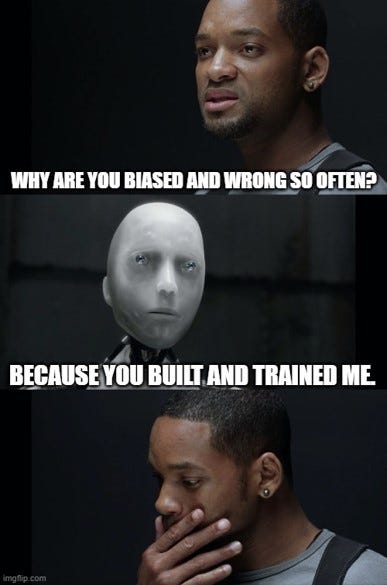Beating AI
Do not outsource your thinking
Welcome, aspiring polyglot! Recently the idea that AI is going to replace the need for learning a second language has come up more frequently. Why this is, I will never understand. To put it frankly, if you are learning a new language to talk to people, AI cannot replace the skill. Speaking through a robot will never be as authentic as speaking yourself. I am not here to convince you, though! Instead, let’s talk about why we still have some time before that is even kind of possible.
It is dangerous to trust robots
AI is a hot topic right now and its utility within the realm of education is something that intrigues me greatly. Personally, I think you can certainly use it to bolster your education, but you must act prudently. The greatest problem that someone can encounter with AI education is that, sometimes, it is simply incorrect. If you do not know enough to know when it is outright wrong, you may find yourself building some very bad habits.
Another problem is that theory and practice are two very different things and the way that AI may have interpreted something is not necessarily the way that the thing was meant to be interpreted. This is doubly true for speaking since the things we say and the things we write are rarely the same. Anyone who is learning French has first hand experience with this particular problem.
Not only that, but because so much within language is context dependent (think, what does the word “get” actually mean?) it can be particularly difficult for an AI to understand things under different contexts unless it is explicitly instructed to take context into account. This is another issue that many people using AI will have to solve: prompting. Incorrect prompting of the AI can send you spiraling down a rabbit hole of half true information.
All that to say, I think AI can be a fabulous learning tool if it is used correctly. I would still place it in the same bucket as language apps, though. A fantastic supplement, but if it is the only thing you are using then it is going to take you years to learn whatever language it is you are seeking to acquire. In short, use it, but make sure that you keep the human element of language learning central. Unless, of course, you plan only to speak to your AI companion in this new language.
Humans struggle with context too
A big issue beyond AI not being able to understand context is that humans, too, struggle with context from time to time. That is partially an individual problem and it is partially owed to the public education system, but this is not about that, so rather than focusing on why it is a problem let us just state that it is a problem. Now, how do you deal with that problem?
Writing is the first and best way to start. Imprecise language is at the heart of many of the greatest problems we face in the world and in our daily lives. Working to speak more accurately and precisely in your native language is crucial because it will automatically carry over into your new language. More than that, when you seek to speak as precisely as possible, you learn to interact more authentically with the world.
Furthermore, this skill will help you when you choose to use AI for learning. By being as precise and accurate as possible, you ensure the greatest likelihood that the information being provided is accurate. Quickly you will realize that there are different words for different contexts and that using them changes the way that the AI responds to your prompting. If you zoom all the way out and think of it the same way, mastering your own language will have the same affect on people around you, as well. For more on the “best” word for the right situation, see this:
How to Integrate Choosing the "Best" Option into Your Language Learning Strategies
Welcome, aspiring polyglot! Of all the things you can focus on when learning a new language, expanding your vocabulary is probably one of the most important. Yes, grammar rules matter, but most people do not understand the grammar of their native language, let alone the language they are learning. By using the language enough over time the grammar will …
Artificial intelligence is a powerful tool when used appropriately, but you cannot use it to outsource your thinking. Your brain is a powerful tool. It has greater processing power than any computer could ever hope to have. If you choose not to use it, you will lose the potency. AI should be used to augment your experience in this world, not outsource it. Whether the early adopters will admit it or not, technology cannot replace bilingualism. People would rather talk to people.
Drawing hands
One of the funniest things at the beginning of the new AI art fad was just how bad it was at drawing hands. For a moment, it was highly relatable. For the most part, things have been sorted and the art is terrifyingly technical now. Of course, since all of AI is generative, it cannot create from nothing. This, again, is where AI falls short as a learning tool. Since it cannot think (the A in AI), you have to rely on your own intuition and knowledge to make inferences.
Corrections are one thing, but the information you walk away with after being corrected is more important. Language learning apps suffer from this as well since we all understand the frustration of completing a sentence 100% correct only to be told by Duolingo the whole thing was incorrect because we fatfingered an extra letter in our haste. Without feedback that is specific to our own needs at that time, language learning is far less effective.
Fortunately, there is a silver lining to all of this. Translators and interpreters have some solid job security. Though the landscape may change and AI will be used within these areas, it is far too risky to leave important documents up to an artificial interpretation when both parties could be in the room speaking to one another instead. If you are competing for an international contract, the person who fluently speaks the languages of all parties will win the contract every time.
Conclusion
Artificial intelligence is an extremely powerful tool, if you know how to use it. I suggest playing around with it during your language learning sessions. Have text conversations with it, ask it questions, but always verify the answers. This is, of course, true about all instruction you receive. Work on a trust but verify system to ensure you are getting the quality of education that you deserve. No one is ever going to be as invested in your future success as you are.
I will admit, I was once worried about the advent of AI and how it would affect my job, but I find that people still prefer to read real writing, speak to real people, and listen to authentic voices. Until AI can actually think, and I believe that time is quite a ways off, it will only ever be a tool. Do your best to remain engaged with the real world. Use it to augment your thinking, not outsource it. Learning a language this way is difficult, but you can do difficult things and be great. So get out and do some difficult things and become great. I am rooting for you.
Requests
If you have anything you would like covered you can reach out to me on X, Instagram, or at odin@secondlanguagestrategies.com.
Additional Resources
Don't want to spend time playing catch up? Pick up the 3 Months to Conversational book now available on Amazon! 3 Months to Conversational
For more long form content be sure to check out the website!
Subscribe for new content on YouTube and TikTok!
Learning Spanish? We have begun aggregating resources in you Spanish Resource Newsletter!
Don't forget to pick up your very own French Language Logbook or Spanish Language Logbook








